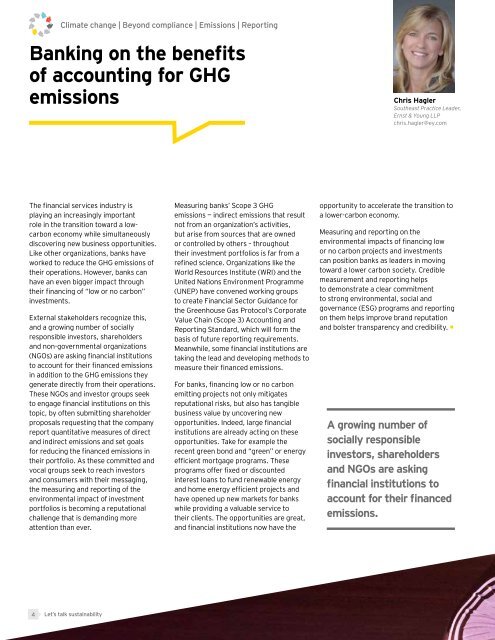EY-Lets-talk-sustainability2
EY-Lets-talk-sustainability2
EY-Lets-talk-sustainability2
You also want an ePaper? Increase the reach of your titles
YUMPU automatically turns print PDFs into web optimized ePapers that Google loves.
Climate change | Beyond compliance | Emissions | Reporting<br />
Banking on the benefits<br />
of accounting for GHG<br />
emissions<br />
Chris Hagler<br />
Southeast Practice Leader,<br />
Ernst & Young LLP<br />
chris.hagler@ey.com<br />
The financial services industry is<br />
playing an increasingly important<br />
role in the transition toward a lowcarbon<br />
economy while simultaneously<br />
discovering new business opportunities.<br />
Like other organizations, banks have<br />
worked to reduce the GHG emissions of<br />
their operations. However, banks can<br />
have an even bigger impact through<br />
their financing of “low or no carbon”<br />
investments.<br />
External stakeholders recognize this,<br />
and a growing number of socially<br />
responsible investors, shareholders<br />
and non-governmental organizations<br />
(NGOs) are asking financial institutions<br />
to account for their financed emissions<br />
in addition to the GHG emissions they<br />
generate directly from their operations.<br />
These NGOs and investor groups seek<br />
to engage financial institutions on this<br />
topic, by often submitting shareholder<br />
proposals requesting that the company<br />
report quantitative measures of direct<br />
and indirect emissions and set goals<br />
for reducing the financed emissions in<br />
their portfolio. As these committed and<br />
vocal groups seek to reach investors<br />
and consumers with their messaging,<br />
the measuring and reporting of the<br />
environmental impact of investment<br />
portfolios is becoming a reputational<br />
challenge that is demanding more<br />
attention than ever.<br />
Measuring banks’ Scope 3 GHG<br />
emissions — indirect emissions that result<br />
not from an organization’s activities,<br />
but arise from sources that are owned<br />
or controlled by others – throughout<br />
their investment portfolios is far from a<br />
refined science. Organizations like the<br />
World Resources Institute (WRI) and the<br />
United Nations Environment Programme<br />
(UNEP) have convened working groups<br />
to create Financial Sector Guidance for<br />
the Greenhouse Gas Protocol’s Corporate<br />
Value Chain (Scope 3) Accounting and<br />
Reporting Standard, which will form the<br />
basis of future reporting requirements.<br />
Meanwhile, some financial institutions are<br />
taking the lead and developing methods to<br />
measure their financed emissions.<br />
For banks, financing low or no carbon<br />
emitting projects not only mitigates<br />
reputational risks, but also has tangible<br />
business value by uncovering new<br />
opportunities. Indeed, large financial<br />
institutions are already acting on these<br />
opportunities. Take for example the<br />
recent green bond and “green” or energy<br />
efficient mortgage programs. These<br />
programs offer fixed or discounted<br />
interest loans to fund renewable energy<br />
and home energy efficient projects and<br />
have opened up new markets for banks<br />
while providing a valuable service to<br />
their clients. The opportunities are great,<br />
and financial institutions now have the<br />
opportunity to accelerate the transition to<br />
a lower-carbon economy.<br />
Measuring and reporting on the<br />
environmental impacts of financing low<br />
or no carbon projects and investments<br />
can position banks as leaders in moving<br />
toward a lower carbon society. Credible<br />
measurement and reporting helps<br />
to demonstrate a clear commitment<br />
to strong environmental, social and<br />
governance (ESG) programs and reporting<br />
on them helps improve brand reputation<br />
and bolster transparency and credibility. •<br />
A growing number of<br />
socially responsible<br />
investors, shareholders<br />
and NGOs are asking<br />
financial institutions to<br />
account for their financed<br />
emissions.<br />
4<br />
Let’s <strong>talk</strong> sustainability


